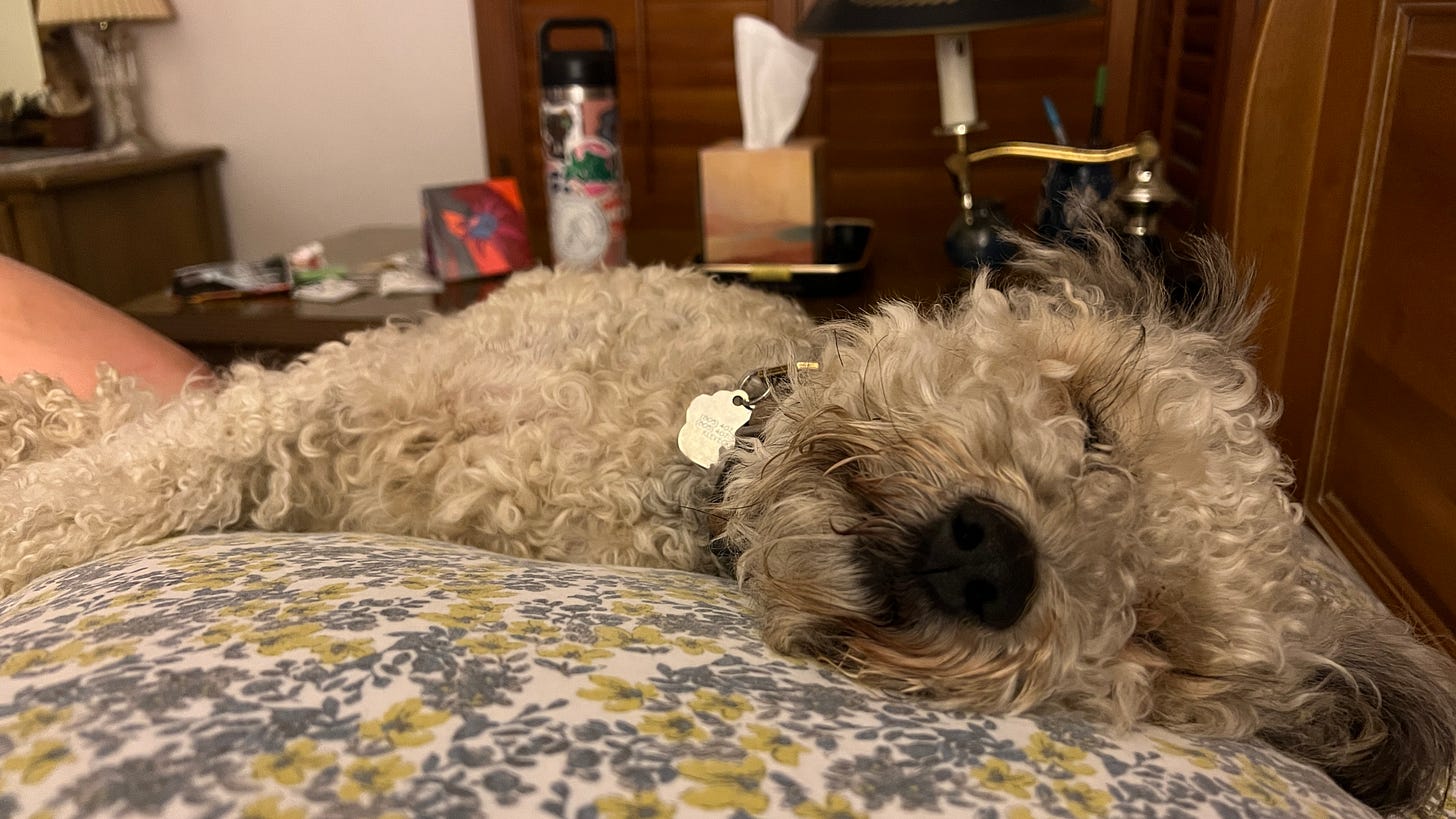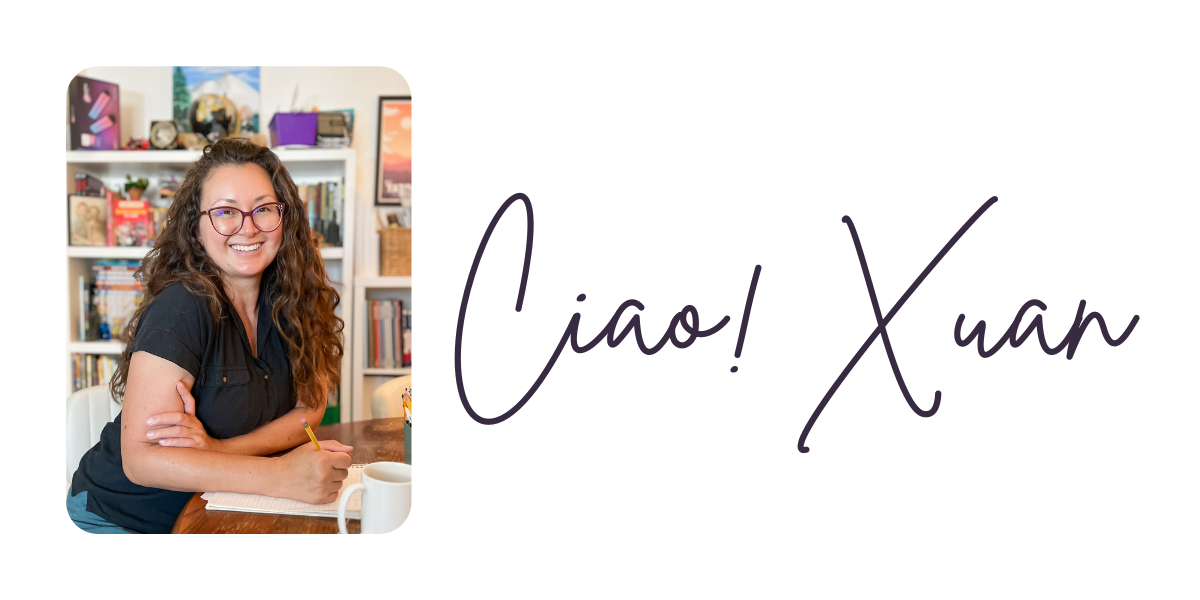It’s been almost a month since I last wrote in my journal, which might explain why my brain feels like an overstuffed junk drawer. Or maybe it was the two cups of coffee I had yesterday instead of my usual matcha latte.
Big mistake. HUGE.
My nervous system did not appreciate the switch. I spent the entire day feeling jittery, my cortisol levels spiking as if I were in imminent danger—except the only thing threatening my life was the pile of laundry I kept ignoring. I felt anxious, like I needed to get things done, but instead, I jumped from one thing to the next without actually finishing anything. At some point, I found myself scrolling social media way more than usual, as if that was going to help me get my life together. (Spoiler: It did not.)
This morning, I’m back to my matcha latte. It’s a little grainy, but that’s probably because I used the last of my almond milk, and I refuse to let that be my problem right now. My dog also woke me up at 4:30 AM to go outside, and I haven’t been able to fall back asleep since, so we’re just rolling with the theme of sleep deprived but making it work.
How the Internet Hijacked Our Brains
As I sat there in the dark, sipping my slightly questionable matcha, I listened to an episode of Stuff They Don’t Want You to Know about how social media affects our focus and attention spans. They talked about how even long-form content on the internet has changed—how articles, blog posts, even books now get formatted for easy scrolling on our smart phones.
And they’re right.
Back in the early ‘90s—yes, I am fully dating myself—I spent hours on bulletin boards, reading long threads on travel forums where people actually wrote paragraphs. Full, meandering thoughts that required patience to read and engage with. It was normal to sit and read something without skimming.
Now? Everything is designed to be digested in tiny, bite-sized pieces. Skimmable. Scrollable. Headlines bolded, paragraphs chopped up for maximum ease. Blog posts aren’t written the way they used to be—now they’re structured for SEO, strategically broken up so you can digest them between push notifications.
Even my writing has changed.
I’ve been writing online for years, and yet, when I sit down to write a Substack post, I catch myself formatting it the same way I would a blog that’s supposed to be optimized for skimming. It’s like I’m still subconsciously leaving room for ads, even though I don’t have any. (And right now, I’m s-t-r-u-g-g-l-i-n-g with keeping the paragraphs as paragraphs 😵💫)
And honestly? I hate that.
I don’t want to write for algorithms. I don’t want to assume people will skim. I like long-form writing. I like getting lost in thoughts and ideas, not just hopping from one hot take to the next.
Which is probably why I naturally gravitate toward long-form content in general—novels, nonfiction books, magazine and journal articles, audiobooks, Substack posts, deep-dive podcasts, movies, bingeable shows I can stream, and even YouTube videos over 30 minutes long. If I’m watching something, I’d rather watch it than consume it in distracted, five-second bursts followed by another short-form video the algorithms deemed I would like, and another, and another. I like sinking deep into ideas, giving them space to unfold, rather than feeling like everything needs to be chopped up and spoon-fed in tiny, digestible bites.

Social Media: A Synthesized Flow State
It’s not just about how we read and write—it’s about how we exist now.
One of the podcast hosts made a statement that really resonated with me: “social media is a synthesized flow state”, constantly fueling us with dopamine hits. The endless scroll, the curated feeds, the perfectly timed notifications—it’s all designed to keep us engaged, to make us crave that next hit. It’s why we doom scroll late into the night, even when we know we should stop.
We can’t even watch movies anymore without being on our phones at the same time. And entertainment is adapting to that—movies and TV shows are being created in a way that allows us to scroll while watching. Background noise, digestible dialogue, nothing too complex because they know we’re only half-paying attention.
And speaking of half-paying attention—it’s Sunday as I write this, and I have YouTube on in the background. The irony is not lost on me. I’m not really watching, but most of my favorite content creators post on Sundays, and I want to support them because I know how much work goes into it. But am I actually absorbing it? Nope.
There have been plenty of times where I’ve had to go back and rewatch something—actually watch it, undistracted—to fully take in what they created. Because that’s what we do now: we’re constantly multitasking (except we’re not actually multitasking—we’re context switching, which is exhausting). We pick up our phones without thinking, checking feeds, responding to messages, reading emails, shopping for things we don’t even need. It’s become automatic.
And the worst part? The technocrats know exactly what they’re doing. They profit from it. The broligarchs are influencing our consumption, making money off of our stolen attention, and controlling our country as well.
Last year, I read Stolen Focus1 by Johann Hari (at least, I think that’s how you spell his name—I refuse to check my phone to confirm because that would be too on-brand for this conversation), and he lays it all out so clearly. Our focus isn’t just slipping away—it’s being taken from us.
Why I Created Voxer-Only Coaching
This is one of the reasons I designed my Voxer-only coaching package—because I know people don’t always have the bandwidth or the attention span or the mental energy or the time to sit on Zoom for a weekly hour-long session. Life is a lot. We’re constantly switching between tasks, managing kids, work, homes, and the never-ending digital noise that’s vying for our attention. Some people don’t want to carve out an hour of their week for a Zoom call with someone they have a parasocial relationship with, and I get that.
With the Voxer app, people can check in when they have the time, when they have the capacity, rather than feeling like they need to be “on” for an hour straight. It’s intentional. It works with real life, and it works for the world we currently live in. But don’t think I’m unaware of the irony of it all.
Writing More, Living More, Screens Less
So, where does that leave me?
I don’t have all the answers, but I know this:
I want to write more—real writing, not just formulaic, click-friendly content. I want to read more long-form pieces instead of just skimming things between distractions. I want to spend less time online and more time actually living.
That’s hard when you have an online business. And it’s even harder when you homeschool your kids, because your schedule doesn’t exactly follow neat, predictable “work hours.”
So instead, I find myself creating content in the in-between moments—while waiting in the car, while cooking dinner, while stealing a few minutes before bed. And I don’t want to spend all those in-between moments glued to a screen.
And Speaking of Screens…
I finally caved in and got my 13-year-old an Apple Watch. Not a smartphone—just the watch. I needed a way to get ahold of him when he’s out, but I didn’t want to hand him a fully loaded smartphone. I thought about an old flip phone, but let’s be real—I also wanted to be able to track him.
Not because I don’t trust him—he’s a good kid. He spends his time hanging out with friends, playing D&D and video games, which, honestly, is about as wholesome as it gets. But then again… I was a “good kid,” too, and we all know how that went in my teens and early 20s 😏
So, Apple Watch it is.
Maybe this is the year I untangle myself from the constant pull of digital life. Maybe I write the way I want to write. Maybe we all detox from our dopamine addiction.
We need more stillness. More time lost in thought. Less time on our devices. We need to go outside. Sit with our thoughts. Meditate. Pick up a hobby. Learn how to get back into a real-life flow state doing something we actually enjoy.
Or maybe I just finish my matcha latte and take a nap this afternoon.
Affiliate Disclaimer: Some links in this post are affiliate links, which means I may earn a small commission—at no extra cost to you—if you make a purchase through them. And yes, the irony is not lost on me that I linked Stolen Focus by Johann Hari using an Amazon affiliate link… a company owned by one of the very broligarchs I just ranted about. But hey, at least it let me double-check the spelling of his name, even though I said I wouldn’t 😜








💗🙌 really enjoyed this and it resonated with me.